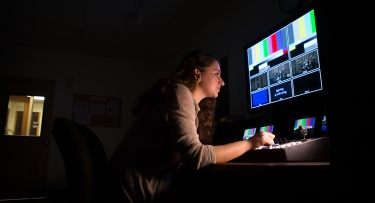
Graduation Year: 2016
School: Social and Behavioral Sciences
Major: International Relations and Diplomacy
Samantha Hernandez ’16, knew she wanted her International Relations and Diplomacy capstone project to bring attention to the living conditions in rural Honduras. What better way to do that than to go there and actually experience it firsthand?
Hernandez’s project was a video interview series that she wrote, shot, edited and produced. Over the course of two weeks in the mountainous highlands of the department of Yoro in Honduras, Hernandez interviewed local villagers in Las Crucitas about their daily lives, what life is like in Honduras and what they need to improve conditions in their rural community.
“Actually being there let me show what life is really like, and it made the people more confident and comfortable being in their homes. It brought a lot of life to the project,” Hernandez said.
Adding another layer of life to the project was Hernandez’s family connection to Honduras. While her mother left Honduras to give her children more opportunities, she still has family there and a close connection to the country. Las Crucitas is where her family is from; her grandfather helped arrange the interviews. That connection and the sacrifices her mother made to enable her and her brothers to get a college education inspired the project.
“My mother always said education is the key and I feel grateful to have the opportunities I’ve had, so I want to give back and use that education to help,” explained Hernandez.
The video highlights the lack of electricity and infrastructure in the village and explains that rural communities are often overlooked by their governments because resources are limited and go to the more populated areas. With no electricity or infrastructure, it makes it nearly impossible for the village to innovate and thrive.
After graduation this May, Hernandez hopes to continue her studies in graduate school and start her own non-profit organization focusing on rural, abandoned villages all over the world, not just in Honduras.
“It’s so important not to forget these villages and people, the people want to improve their communities and educate their children, but they can’t do it alone. By bringing attention to their needs, hopefully I can help them get the resources they need to build infrastructures and create thriving communities,” said Hernandez.
